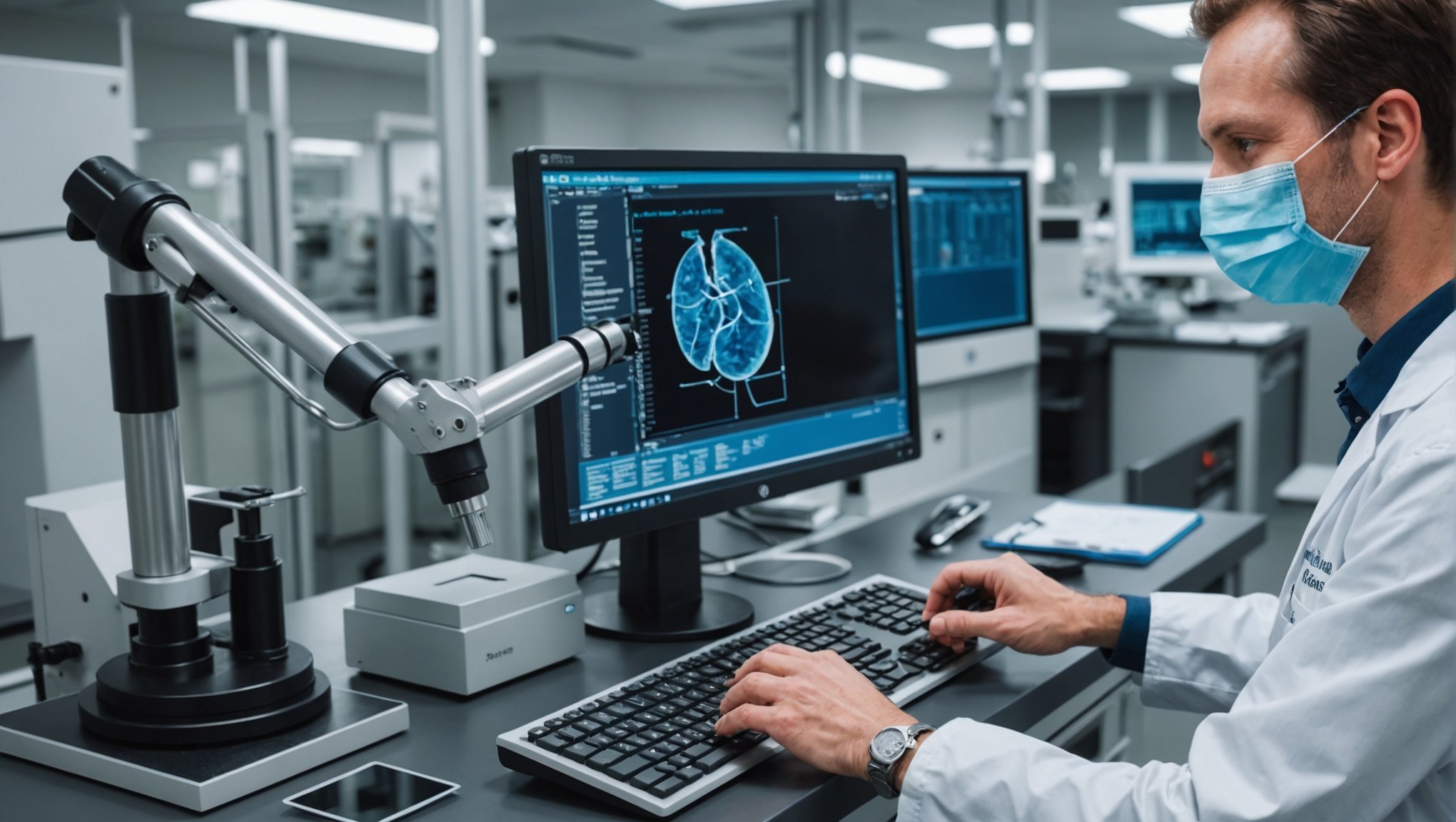Revolutionizing Pharmaceutical Manufacturing: How AI Can Enhance and Simplify Validation Processes
The pharmaceutical industry is on the cusp of a significant transformation, driven by the integration of artificial intelligence (AI) and other advanced technologies. One of the most critical areas where AI is making a profound impact is in the validation processes of pharmaceutical manufacturing. In this article, we will delve into how AI is revolutionizing these processes, enhancing efficiency, quality, and compliance.
The State of Validation in Pharmaceutical Manufacturing
Validation is a cornerstone of pharmaceutical manufacturing, ensuring that products meet stringent quality and safety standards. The Commissioning, Qualification, and Validation (CQV) framework is a structured, multi-phase approach that pharmaceutical companies follow to maintain compliance with Good Manufacturing Practices (GMP) and regulatory requirements[2].
However, traditional validation processes are often time-consuming, labor-intensive, and prone to human errors. For instance, manual data collection, analysis, and reporting can be cumbersome and may lead to discrepancies. Here is where AI steps in to transform these processes.
Enhanced Efficiency Through Automation
AI and machine learning (ML) are revolutionizing the way data is analyzed and processes are optimized in CQV. Automation is central to this transformation, particularly through the integration of AI and Internet of Things (IoT) technologies.
In parallel : Revolutionizing Disaster Response: How AI Enhances the Detection of Structural Damage in Buildings
Key Benefits of Automation
- Enhanced Efficiency: Automation speeds up time-consuming tasks like data collection, analysis, reporting, and system monitoring, significantly reducing the time needed for qualification and validation[2].
- Error Reduction: Automated processes minimize human intervention, reducing the risk of errors in areas like data entry and equipment calibration. This improves accuracy and consistency[2].
- Streamlined Validation: Automation simplifies complex CQV processes, facilitating large-scale validation efforts while maintaining high standards of quality and compliance[2].
For example, AI can rapidly analyze large datasets collected during validation, identifying trends, anomalies, and deviations that may be overlooked by human analysts. This real-time data analysis enables faster identification of potential issues and allows for dynamic adjustments to the validation protocol[2].
Real-Time Data Monitoring and Analysis
One of the most significant advantages of AI in pharmaceutical manufacturing is its ability to monitor and analyze data in real-time. This capability is particularly valuable in several areas:
Predictive Maintenance
AI can predict equipment failures by analyzing data from sensors and manufacturing systems, identifying patterns that indicate potential issues. This allows for preventive maintenance, reducing downtime and ensuring consistent product quality[1][5].
Quality Control
Real-time data monitoring enables continuous quality control. AI algorithms can analyze production data to detect any deviations from the expected standards, allowing for immediate corrective actions. This ensures that the final product meets the required quality parameters[1][5].
Supply Chain Management
AI can also optimize supply chain management by predicting demand and monitoring product quality in real-time. This helps in managing inventory levels, reducing the risk of stockouts, and ensuring that high-quality products reach the market efficiently[3][4].
AI-Assisted Formulation Development and Drug Discovery
AI is not only enhancing validation processes but also playing a crucial role in the early stages of drug development.
Formulation Development
AI-assisted formulation development uses machine learning to predict the behavior of different combinations of active ingredients and excipients. By simulating various formulation scenarios, AI can identify optimal compositions that enhance drug stability, efficacy, and manufacturability. This accelerates the formulation process and reduces the need for extensive laboratory testing[1].
Drug Discovery
Generative AI is being used to discover new molecules, predict drug interactions, and even synthesize new protein sequences. These algorithms can explore vast chemical spaces to identify promising compounds that can be synthesized and tested in the lab, significantly accelerating the initial phase of drug discovery[3].
Regulatory Compliance and Safety
Ensuring regulatory compliance is another critical area where AI is making a significant impact.
Automated Document Analysis
AI can automate the analysis of documents and processes against established guidelines using natural language processing (NLP) and machine learning algorithms. This helps in reviewing submissions, identifying discrepancies, and ensuring adherence to regulatory standards[1][4].
Pharmacovigilance
AI can assist in analyzing pharmacovigilance data, quickly identifying potential adverse drug reactions and facilitating rapid and effective responses to ensure patient safety. This real-time monitoring of drug safety post-approval is crucial for maintaining public health[4].
Challenges and Solutions
While AI offers numerous benefits, its implementation in the pharmaceutical industry is not without challenges.
Reproducibility of Results
One of the key challenges is the reproducibility of AI model results. AI models trained on specific datasets may not perform consistently across different populations or under varying conditions. To address this, pharmaceutical companies should standardize AI training datasets and validate models across diverse patient demographics and conditions[1].
Data Quality
The quality and integrity of the available data are crucial for the effectiveness of AI algorithms. Incomplete, biased, or low-quality data can compromise the results. Therefore, it is essential to ensure comprehensive data collection from diverse sources and maintain data accuracy, integrity, and consistency through rigorous management[3].
Building a Robust AI Infrastructure
To effectively implement AI in pharmaceutical manufacturing, a robust infrastructure is necessary.
Data Management
Data management is the foundation of any AI infrastructure. Pharmaceutical companies must ensure comprehensive data collection from diverse sources, integrating them into a unified system. This includes maintaining data accuracy, integrity, and consistency and ensuring data security with robust protection measures in compliance with regulations such as GDPR[3].
Technological Integration
Technological integration is another essential pillar. AI requires computational power, which can be provided by cloud computing. Advanced analytics platforms supporting machine learning (ML) and deep learning (DL) are essential for developing sophisticated models. Interoperability between systems is vital, facilitated by the use of standardized APIs and protocols[3].
Practical Insights and Actionable Advice
For pharmaceutical companies looking to leverage AI in their validation processes, here are some practical insights and actionable advice:
Collaborate with Technology Partners
Pharmaceutical companies should consider partnering with technology companies and AI-specialized startups to leverage expertise and accelerate innovation. These collaborations can help integrate AI solutions into various stages of the value chain[3].
Invest in Advanced Analytics Platforms
Investing in advanced analytics platforms that centralize data and offer advanced analytical tools can facilitate the analysis of large volumes of data and the extraction of actionable insights. This can significantly enhance decision-making and operational efficiency[3].
Focus on Data Quality
Ensuring the quality and integrity of the data is crucial. Companies should focus on comprehensive data collection, rigorous data management, and maintaining data accuracy and consistency[3].
The integration of AI in pharmaceutical manufacturing is revolutionizing the way validation processes are conducted. From enhancing efficiency and reducing errors to improving regulatory compliance and safety, AI is transforming the industry in multiple ways.
Here is a summary of the key points:
| Area of Impact | Description | Benefits |
|---|---|---|
| Automation | Automates data collection, analysis, and reporting | Reduces time and errors, enhances efficiency |
| Real-Time Monitoring | Monitors production data in real-time | Ensures quality control, predictive maintenance |
| Formulation Development | Predicts optimal drug formulations | Accelerates formulation process, reduces laboratory testing |
| Drug Discovery | Identifies new molecules and predicts drug interactions | Accelerates drug discovery phase |
| Regulatory Compliance | Automates document analysis and ensures adherence to guidelines | Streamlines regulatory processes, ensures compliance |
| Data Management | Ensures comprehensive data collection and integrity | Supports effective AI model performance |
In the words of Joga Gobburu, PhD, MBA, “AI can automate many routine operations in drug development, such as data entry, validation, and analysis. By processing large datasets faster than humans can, AI reduces human error and increases efficiency”[4].
As the pharmaceutical industry continues to evolve, embracing AI and other advanced technologies will be crucial for maintaining a competitive edge and ensuring the delivery of high-quality, safe, and effective pharmaceutical products.











